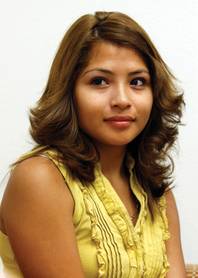Sunday, Oct. 18, 2009 | 2 a.m.

UNLV sophomore Vanessa Ocampo, who is studying hotel administration, did well in high school but found herself struggling in college.
In Today's Sun
- Why so many aren’t ready (10-18-2009)
Sun Coverage
Beyond the Sun
After graduating from Cheyenne High School with a B-plus grade point average, Vanessa Ocampo figured she was ready for her freshman year at UNLV.
She was wrong.
“I thought I was going to have a smooth start,” Ocampo said. “But I was really struggling.”
Ocampo found it difficult to balance the demands of her academics with her part-time job. And the tests her professors gave were much different from the ones she had always nailed in high school. Those exams tested her on what was discussed in class; now she was now being quizzed about reading material she was supposed to have studied on her own.
Ocampo’s academic scholarship — earned by her high school performance — was at risk.
One of her professors in the hotel administration program urged Ocampo to visit the university’s Academic Success Center. Launched in fall 2008, the center is in a recently renovated one-story building across from the Student Services Complex.
Reluctantly, she checked it out — and in short order was accepting tutoring, getting help with her time management and study skills and had been assigned a graduate student, Nicole Rogers, to be her mentor.
Knowing she could call Rogers for advice — or even just to talk about her day — made a huge difference, said Ocampo, now a sophomore.
“I got help organizing my class schedule and work,” Ocampo said. “After I came to the center, I finally got a project turned in on time.”
The center averages about 2,200 visits per month and its dean, Ann McDonough, wants to help more by offering tutoring sessions in residence halls and asking faculty to encourage individual students to seek help there.
The center is open to all students seeking academic help, but with a focus on freshmen.
The challenge, said McDonough, is “diagnosing early on and getting at what is the best prescription” to boost the student’s academic achievement.
Some students have test anxiety or poor study habits. Others need to fill knowledge gaps that existed long before they arrive on campus.
In addition to helping individual students, McDonough is looking for patterns of academic shortfalls so the university can move to a more systemic approach.
“We have to get better at the diagnosis,” McDonough said. “And once we have the diagnosis, we have to be ready with the prescription.”
McDonough is establishing a one-credit course in study skills and hopes the curriculum will be adopted by high schools — to help get college-bound students on the right track earlier in their academic journeys. Because of her expertise in remediation, McDonough is part of the team developing a series of tests to help identify college freshmen who need help with reading, writing and mathematics.
The first two years at a four-year college can be rough, says Raquel Jupiter, who attended a junior college in California so she’d be better prepared when she transferred to UNLV.
“There’s a lot of growth that goes on in those two years,” said Jupiter, who now is one of the graduate student mentors at the Academic Success Center.
Jupiter, who played basketball for UNLV, said she had the additional mentoring that comes with being a varsity athlete. But “there are a lot more regular students on campus than there are athletes,” and the Academic Success Center offers an extra measure of support for struggling students who might otherwise go unnoticed.
The first step is often the hardest, McDonough said.
“We applaud people who ask for help,” McDonough said. “It does take a lot of courage.”

Join the Discussion:
Check this out for a full explanation of our conversion to the LiveFyre commenting system and instructions on how to sign up for an account.
Full comments policy